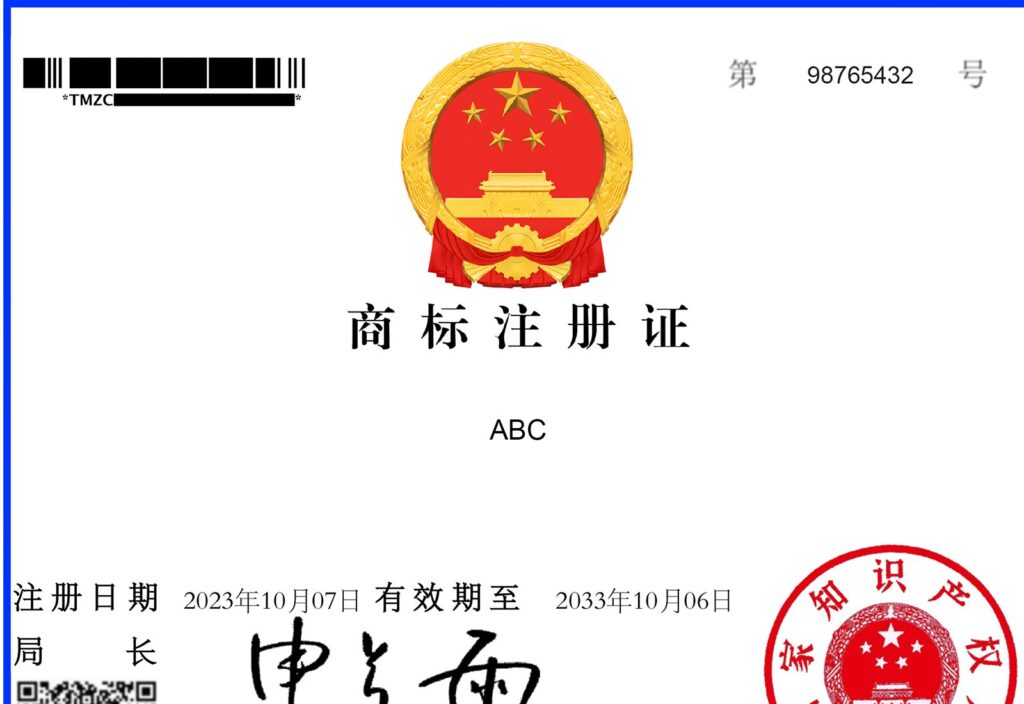China Trademark Registered? Here’s How to Keep it Working for You
What happens when you register a China trademark? What follows is an example of the emails our China trademark lawyers send clients after their trademark is registered, with some additional notes in bold italics.
Dear Roberta,I am pleased to enclose the registration certificate issued by the China National Intellectual Property Administration (CNIPA) for the ABC trademark (No. 98765432), owned by ABC, Inc. A courtesy English translation accompanies the certificate. Please note that paper registration certificates are no longer being issued by CNIPA. The electronic registration certificate that is attached to the email has full legal validity. A copy of the same will need to be presented to the authorities in order to enforce trademark rights that it represents (for example, to sue a counterfeiter). With that in mind, make sure the certificate is properly saved. The best practice is to print a hard copy and treat it as an original (safeguarding it together with hard copy certificates, previously issued by CNIPA and still issued by some countries). If necessary, CNIPA can reissue the certificate, but this could delay time-sensitive enforcement actions.Please note the following:
1. An application to change name or address should be filed CNIPA if the registrant’s name and/or its address changes. Keeping name and address information current will help avoid delays in case enforcement of trademark rights is necessary. Note that a name change is different from an assignment. If ABC, Inc. changes its name to ABCD, Inc., that is just a name change. However, if ABC, Inc. sells the trademark to XYZ, Inc., that constitutes an assignment (see 2. below), in which case the process is a bit more complicated.
2. An assignment application should be filed with CNIPA if the registered trademark is assigned by you to a different party. To assign a trademark, the parties will need to enter into a written assignment agreement, which can be a very simple document. This agreement is then submitted to CNIPA, together with an application to record the assignment.
3. A license recordation application should be filed with CNIPA if a license to use the registered mark is granted to a different party. A license is different from an assignment. In an assignment, ownership of the trademark is transferred to another party. By contrast, a license just grants another party (the “licensee”) the right to use the trademark, with ownership remaining in the hands of the original owner (the “licensor”). The licensee could be ABC, Inc.’s China subsidiary, or an authorized distributor.
4. The trademark registration may be cancelled by CNIPA if the trademark is not used by you or a licensed party in relation to the goods covered by the registration for a period of three (3) consecutive years. Trademark owners do not need to proactively demonstrate use of a trademark in order to register it, nor to maintain the registration. However, a third party can request the cancellation of the trademark registration if the trademark goes unused for a period of 3 consecutive years. To guard against this possibility, owners should ensure that the trademark is not left unused for long periods of times. In addition, use of the trademark should be documented, in order to have evidence of use to present if a cancellation on the basis of non-use is requested.
5. The period of validity of the registered mark is ten (10) years, starting on the registration date. An application for renewal of the registration may be filed with CNIPA at any time within the 12 months prior to the expiration date. In some countries, the validity period for a trademark registration starts on the application date, but in China it starts on the date of registration.
While we endeavor to inform clients of renewal deadlines, please note that these reminders are sent as a courtesy and contingent upon us being able to establish contact with you. With that in mind, please ensure that you keep us informed of any changes to your contact information. In addition, I strongly encourage you to calendar this date. Be sure to keep your trademark counsel apprised of your current contact information at all times. When a trademark is up for renewal, counsel will do all it can to track down the owner (or someone authorized to act on its behalf), but this is not always possible. Relatedly, and particularly in the case of corporate owners, it is important to ensure that there is continuity when it comes to trademark matters. The best practice is to have multiple recipients on the relevant distribution list, to provide redundancies in case of employee departures.
Once again, thank you for the opportunity to work with you on this matter. Please do not hesitate to contact me if you have any questions or if we can be of further assistance.
Best regards,
And that is it! Any questions?

























